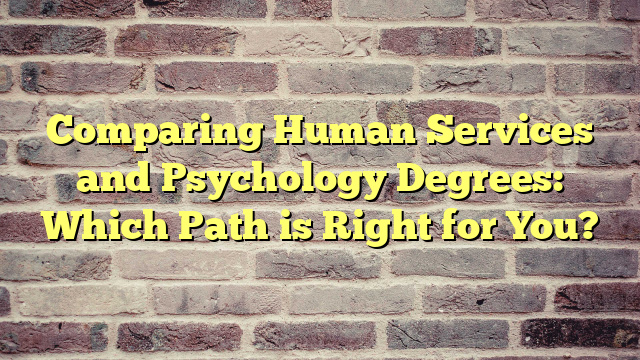Comparing Human Services and Psychology Degrees: Which Path is Right for You?
Comparing Human Services and Psychology Degrees: Which Path is Right for You?
Introduction
Choosing a career path can be a daunting task, especially when there are multiple options that seem equally appealing. Two popular fields that often attract individuals who are passionate about helping others are human services and psychology. While both fields focus on understanding and assisting individuals, they differ in various aspects. This article aims to compare human services and psychology degrees to help you determine which path is right for you.
Education and Training
One of the primary differences between human services and psychology degrees lies in the education and training required. A degree in human services typically requires a bachelor’s degree, although some positions may require a master’s degree. On the other hand, psychology degrees often require a minimum of a bachelor’s degree, but many professionals pursue advanced degrees such as a master’s or doctorate.
Additionally, the coursework for these degrees differs. Human services degrees often include courses in social work, counseling techniques, case management, and community outreach. Psychology degrees, on the other hand, focus on courses such as abnormal psychology, research methods, cognitive psychology, and developmental psychology.
Career Opportunities
Another important factor to consider when comparing human services and psychology degrees is the range of career opportunities available in each field.
With a degree in human services, individuals can pursue careers in various settings such as social service agencies, non-profit organizations, community centers, and government agencies. Some common job titles in human services include social worker, case manager, community outreach coordinator, and substance abuse counselor.
On the other hand, a degree in psychology opens up a wide range of career options. Psychologists can work in private practice, hospitals, schools, research institutions, and government agencies. Some common job titles in psychology include clinical psychologist, counseling psychologist, research psychologist, and industrial-organizational psychologist.
Salary and Job Outlook
Salary and job outlook are crucial factors to consider when choosing a career path. While both human services and psychology fields offer opportunities to make a positive impact on individuals’ lives, there are differences in terms of earning potential and job prospects.
In general, individuals with a degree in psychology tend to have higher earning potential compared to those with a degree in human services. According to the Bureau of Labor Statistics, the median annual wage for psychologists was $80,370 in May 2020, while the median annual wage for social workers, a common profession in human services, was $51,760.
When it comes to job outlook, both fields have positive prospects. The demand for professionals in human services is expected to grow by 17% from 2019 to 2029, which is much faster than the average for all occupations. Similarly, the demand for psychologists is projected to grow by 3% during the same period.
Skills and Personal Qualities
While education and career opportunities are important considerations, it is also essential to assess your skills and personal qualities to determine which field aligns better with your strengths.
Human services professionals require excellent communication and interpersonal skills to effectively work with diverse populations. They should also possess empathy, compassion, and the ability to handle challenging situations. Additionally, problem-solving and organizational skills are crucial in this field.
Psychologists, on the other hand, need strong analytical and research skills. They should be able to critically analyze data, conduct experiments, and interpret findings. Additionally, psychologists should have excellent listening and communication skills to understand their clients’ needs and provide appropriate guidance.
Conclusion
Choosing between a human services and psychology degree can be a challenging decision. Both fields offer rewarding careers that involve helping others, but they differ in terms of education, career opportunities, salary, and required skills. It is important to carefully consider your interests, strengths, and long-term goals before making a decision. Ultimately, the right path for you will depend on your individual preferences and aspirations.

